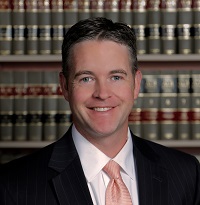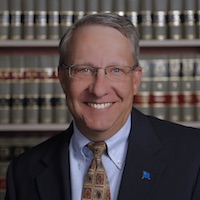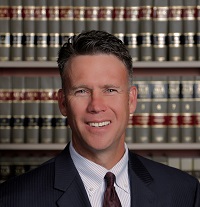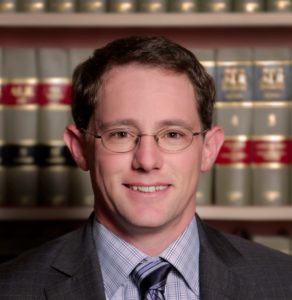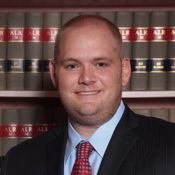
Joel W. Locke Elected to Nevada State Bar Board of Governors
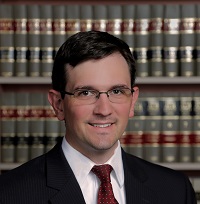
Joel W. Locke, a partner at Allison MacKenzie Law Firm, has been elected to the Nevada State Bar Board of Governors. He was elected and sworn in on Thursday, June 27, 2019 at the State Bar of Nevada Annual Meeting which was held in Vail, Colorado. Members of the Board help promote the integrity of the legal profession, encourage professional growth, and provide the opportunity to give back to the community.
The Board of Governors is comprised of 15 members representing the four state districts defined in Supreme Court Rule 81. Elections for the Board are held annually, and governors are selected by the members of their districts to serve two-year terms. Also serving on the Board is the immediate past president and two ex-officio members representing the William S. Boyd School of Law and the Board of Bar Examiners.
The Board of Governors assists in implementing administrative functions of the State Bar, establishing policies and procedures, and affecting rule changes; the Board also takes legislative positions relative to the administration of justice, and oversees the Bar’s fiduciary responsibilities. The State Bar of Nevada has been governing the legal profession, serving its members, and protecting the public interests in Nevada since 1928.
Regarding his election, Joel W. Locke stated: “I am honored to serve as Carson City’s District Representative on the Board of Governors and am humbled by the support of my colleagues in the Carson City legal community. I look forward to giving back to the legal profession and serving with the esteemed members of the Board during my term.”
Joel W. Locke joined Allison MacKenzie in 2007. A native Nevadan, Joel Locke graduated from the University of Nevada, Reno in 2000, and then obtained his law degree from Gonzaga University School of Law in 2006. Subsequently, he was admitted to practice law in the State of Nevada in 2006. Joel’s areas of legal practice include: Family Law, Probate Law, Guardianships, Employment Law, and more. Allison MacKenzie Law Firm is proud of Joel’s election and dedication to serve on the Board of Governors. The firm remains dedicated to civic service and encourages its team of talented attorneys and staff to support various community-minded organizations in the area.
In an article entitled “The Importance of an Estate Plan” drafted earlier this year, we discussed the benefits of future planning as it relates to persons of all income brackets. A general background was presented providing the readers an opportunity to understand the importance of an estate plan, and more specifically the advantages of a Trust, powers of attorney, and/or living wills to ensure that a person’s current desires would be followed through at a time when they could not make decisions for themselves, or upon their death. As a follow up to The Importance of an Estate Plan, this article will discuss a rarely used, but important subset of estate planning for clients who want to provide for their beloved pets in addition to their family members.
Unsurprisingly, most people consider their pets as an important part of their family. The purpose of an estate plan is to ensure that one’s property is cared for and distributed as the Grantor desires. Likewise, the purpose of creating enforceable documents regarding one’s pets is to ensure that they are properly cared for and placed in a loving home for the remainder of their lifetimes.
With this idea in mind, a Grantor can ensure their pets are provided for when they are unable to care for their pets themselves. Such provisions in an estate plan can be as simple or elaborate as one desires. A client may merely designate who will take custody of the family pets, or may choose to provide a comprehensive plan for who will care for the pets, including providing funds for their care, and donating any residual funds to various shelters in their pet’s name upon their passing. Certainly, a Grantor can leave their estate to whomever they decide, including their pets, and such provisions will be followed just as any other distribution or request contained in an individual’s Trust or estate plan.
Whether you already have an established trust that does not provide for your animals, or if you are planning on establishing a family trust and wish to include provisions for your animals, it is important that you discuss these and other estate planning issues with competent legal counsel. Be sure to that your wishes are known in advance whatever they may be. At Allison MacKenzie, Ltd., our attorneys are available to discuss these estate planning issues with you whether you already have an established trust that does not provide for your animals, or if you are planning on establishing a family trust and wish to include provisions for your animals.
Allison MacKenzie shareholder Ryan Russell has been re-elected to serve as Carson City’s representative on the State Bar of Nevada’s Board of Governors.
Comprised of 15 members representing the four state districts defined in Supreme Court Rule 81, the Board of Governors carries out the State Bar’s administrative functions, sets policies and procedures, affects rule changes, takes legislative positions relative to the administration of justice, and oversees the Bar’s fiduciary responsibilities. Elections are held annually and governors are selected by the members of their districts to serve two-year terms.
A native of Carson City, Ryan has been an attorney at Allison MacKenzie since 2004. His primary areas of practice include Local Government and Entity Law. In addition to his work at Allison MacKenzie, Ryan is also extremely active in his service of the community. He currently serves as a Special Master for the Carson City Juvenile Court and Judge Pro Tem for the Carson City Justice and Municipal Court. Ryan also volunteers his time to the Boys and Girls Club of Western Nevada and is a member of the Carson City Rotary Club.
Ryan was recently recognized as one of the Top Attorneys in Northern Nevada by Nevada Business Magazine. Each year, the Legal Elite list highlights the top 4 percent of attorneys in the state as nominated and voted on by the legal community.
Allison MacKenzie is proud of Ryan’s re-election to the Board of Governors and of his ongoing dedication to civic service. Ryan’s accomplishments are part of the firm’s rich legacy of commitment to both its clients and its community.
Allison MacKenzie is proud to announce that five attorneys have been recognized as Top Attorneys in Northern Nevada by Nevada Business Magazine. Each year, the publication releases its Legal Elite list highlighting the top 4 percent of attorneys in the state. After a rigorous nomination, verification, and voting process, Allison MacKenzie attorneys James Cavilia, Chris MacKenzie, Ryan Russell, Joel W. Locke, and Kevin Benson were named as part of the 2017 Legal Elite.
Legal Elite attorneys are nominated by votes from their peers in the legal community. Nearly 6,400 nominations were collected throughout the state of Nevada for Legal Elite this year. After closing the nomination process, every ballot was reviewed for eligibility and every voting attorney was verified with the State Bar. Each nominated attorney was then scored based on the number and type of votes received. Votes from within their own firm were given a score of one and votes from someone at an outside firm were given a weighted score of three. The top scorers are then verified again before officially being named to the final list. This thorough selection and vetting process ensures that Legal Elite includes and recognizes only the most exceptional attorneys in Nevada.
James Cavilia, Chris MacKenzie, Ryan Russell, and Joel W. Locke are partners at Allison MacKenzie; Kevin Benson recently joined the firm as an associate attorney. All five attorneys are native Nevadans who have dedicated their careers to serving the communities of Northern Nevada.
James joined Allison MacKenzie in 1992; his practice areas include Real Property and Property Development Law. Chris has been with the law firm for 24 years and focuses his efforts on Business and Administrative Law. Ryan primarily practices Local Government and Entity Law and has been with the firm since 2004. Joel celebrates 10 years with Allison MacKenzie this year and focuses on Estate Planning and Family Law. Kevin came on board earlier this year, and his primary area of practice is Litigation and Appeals.
Congratulations to James, Chris, Ryan, Joel, and Kevin for their outstanding work and ongoing commitment to superior legal representation.
Many people question the necessity of an estate plan and often conclude that the size of their estate does not warrant any future planning. However, estate planning is no longer only considered a vehicle for the wealthy and is used by persons of all income brackets to ensure their possessions go where they want upon their death. Without an estate plan, all of your property passes by operation of law, and you will have no say in where or to whom your possessions go. Fortunately, there are several choices in Nevada available for you to direct where your possessions go upon your passing, the most popular being a Last Will and Testament (“Will”) or Trust.
Upon executing a Will, you can nominate a Personal Representative and specifically detail who will receive your belongings upon your death. While this may accomplish your goal in ensuring that your property goes where you desire, your Personal Representative will still have to go through probate, a costly and time consuming Court process. In Nevada, there are four different levels of probate ranging from estates with a total value of less than $25,000 to estates exceeding $300,000. At each level, additional Court involvement is required, necessarily entailing higher costs and expense to your estate. Further, Nevada law entitles attorneys to compensation based on a percentage of the size of the probate estate. For example, Nevada law provides attorneys statutory compensation in the approximate amount of $9,000 for administering and probating a $300,000 estate. Alternatively, attorneys may charge the estate on an hourly basis for the time spent in the probate process. At Allison MacKenzie, Ltd., we charge the estate the lesser of the two amounts, allowing more of your estate to pass to your beneficiaries as desired.
Alternatively, the most popular form of future planning available to you is a Trust. While a Trust accomplishes the same goal as a Will, property in a Trust does not have to go through probate or be administered by a Court. Further, with recent changes in federal law, the vast majority of estates are no longer subject to additional taxes. This has allowed the attorneys at Allison MacKenzie, Ltd., to prepare Trusts and estate plans that easily accomplish your goals without convoluted legal jargon. In addition to the Trust itself, these estate plans include documents such as durable powers of attorney and living wills which set forth your personal desire regarding care during your life, in addition to the Trust which directs distribution of your property upon your death. At Allison MacKenzie, Ltd., all of these documents can be prepared for less than one-third of the expense your estate would be responsible for if it had to be probated under a Will.
Kyle Winter is a Nevada native and attorney at Allison MacKenzie Law Firm in Carson City. His areas of practice include Family Law, Estate Planning, Guardianships, and Probate Law.
Allison MacKenzie Attorney, Jordan Walsh, Explains the Department of Labor’s Final Rule
The way we plan for retirement in the United States has changed drastically in recent years. In the past, employees could rely on their pension, which was typically managed by a financial expert, to support them through retirement. Today, for most of us, pensions are things of the past, and we, as individuals, are responsible for making the financial choices that will shape when and how we may retire.
While this system provides retirement savers with the flexibility to make financial choices that are uniquely tailored for their situations, this method of saving is fraught with pitfalls for retirement savers because most of us lack the expertise, time, and confidence, to invest our savings in a manner that will allow us to efficiently meet our retirement goals. Accordingly, we look to financial advisors to assist us in making smart financial decisions that will allow us to reach our retirement saving goals.
While most of us have good relationships with our financial advisors, statistics suggest there’s a segment of financial advisors who abuse the trust of their clients by putting their own financial gain above that of their clients. The Department of Labor (DOL) and the White House Council of Economic Advisors (CEA) estimate on average conflicts of interest between unscrupulous financial advisors and their clients cause retirement savers to earn one full percentage point less annually than would be expected based on the status of the economy on their returns.
Furthermore, the DOL estimates such advisors cause their clients to waste upwards of $17 billion of retirement savings every year on exorbitant fees and lost revenue associated with the purchase of ill-advised financial products resulting from a conflict of interest. These conflicts of interest can occur because financial advisors aren’t currently held to a fiduciary standard under the law, and for this reason, they owe their clients no duty to provide advice that aligns with the client’s financial goals. In fact, it’s common for firms and purveyors of financial products to provide financial incentives to advisors whose clients invest in certain financial products.
For the complete article, visit: Nevada Appeal.
Jordan Walsh is an associate with Allison MacKenzie Law Firm with primary practice in the areas of Labor and Employment Law and Civil Litigation. Jordan was admitted to practice in Nevada and California in 2014.
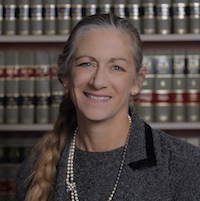
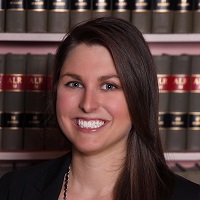 Allison MacKenzie Attorneys, Joan C. Wright and S. Jordan Dunlap, Recognized for Their Pro Bono Service
Allison MacKenzie Attorneys, Joan C. Wright and S. Jordan Dunlap, Recognized for Their Pro Bono Service
January 22, 2016
Carson City, Nevada
For the second year in a row, Volunteer Attorneys for Rural Nevadans (VARN) has recognized Allison MacKenzie, LTD. attorneys for their outstanding volunteer pro bono service.
VARN holds an annual Pro Bono Service Awards reception held in the Supreme Court Rotunda to honor those members of Nevada’s legal community who participate in the organization’s Pro Bono Program by providing exceptional legal services to low-income rural Nevadans.
On January 20, 2016, two Allison MacKenzie, LTD attorneys, Joan C. Wright and S. Jordan Dunlap, were honored for their participation in VARN events, including the organization’s annual legal aid
Attorneys Recognized for Their Pro Bono Service
 Jordan Dunlap joined Allison MacKenzie as an associate attorney in June, 2015. She is a graduate of the University of Oregon School of Law, and is licensed to practice in both Nevada and California. A resident of Stateline, Nevada, Jordan is a member of the Tahoe Regional Young Professionals as well as the American, Carson, Douglas, and Washoe County Bar Associations.
Jordan Dunlap joined Allison MacKenzie as an associate attorney in June, 2015. She is a graduate of the University of Oregon School of Law, and is licensed to practice in both Nevada and California. A resident of Stateline, Nevada, Jordan is a member of the Tahoe Regional Young Professionals as well as the American, Carson, Douglas, and Washoe County Bar Associations.
In law school, Jordan was elected to the Executive Board of the Journal of Environmental Law and Litigation. Her strong legal research and writing skills earned her positions as Research Assistant to Deans, Professors, and Judges, and a law clerk position to the Lane County, Oregon, County Counsel.
Upon graduation from law school, Jordan returned to the south shore of Lake Tahoe, Nevada, to make her home and begin her legal career in 2013. Her work and training experience in law school and her time as a staff member of the Tahoe Regional Planning Agency have helped her become familiar with the unique challenges associated with living in the Tahoe Basin, and have fostered her interest in renewable resources, environmental law, land use law, and water rights law.
Jordan is outdoor enthusiast and enjoys taking advantage of the opportunities for sport and exploration that make living in the heart of the Sierras such a privilege.
Jordan looks forward to serving her neighbors in the Carson – Tahoe community. To meet Jordan, please call her at (775) 687-0202 or email her at [email protected].
By Mike Pavlakis, Allison MacKenzie, Ltd.
Ryan Russell has been re-elected to serve as Carson City’s representative on the State Bar of Nevada’s Board of Governors. The Board of Governors is comprised of 15 members representing the four state districts defined in Supreme Court Rule 81. Elections for the Board are held annually and governors are selected by the members of their districts to serve two-year terms.
The Board of Governors carries out the State Bar’s administrative functions, sets policies and procedures, affects rule changes, takes legislative positions relative to the administration of justice and oversees the Bar’s fiduciary responsibilities. Members are encouraged to contact their district representatives with concerns pertaining to the profession. The mission of the Board of Governors is to 1) govern the legal profession in the State of Nevada, subject to the approval of the Nevada Supreme Court; 2) aid in the advance of jurisprudence and in the improvement of administration of justice; 3) promote reform in the law and in judicial procedure; 4) uphold and elevate the standard of honor, integrity, and courtesy in the legal profession; 5) encourage higher and better education for membership in the profession; 6) promote a spirit of cordiality and true friendship among members of the Bar; and 7) manage the business of the State Bar in a prudent manner.
In his role as a member of the Board of Governors, Ryan serves on the Board’s Budget Committee as well as on the Board’s Personnel and Compensation Committee. Ryan also serves on the Board of Governor’s Standing Committee of Continuing Legal Education. Ryan is the liaison to the Business Law Section and Solo and Small Practice Section.
Ryan continues to serve on the Boys and Girls Club of Western Nevada’s Board of Directors as well, and continues his service as a Judge Pro Tempore. We have always been proud of the civic service our attorneys provide, and are proud that a member of our firm has earned re-election as Carson City’s representative on the State Bar’s Board of Governors.
In addition, Mr. Russell recently was named in Top 10 Family Law Attorneys in Nevada by the National Academy of Family Law Attorneys (“NAFLA”).
The NAFLA recognizes the top family law attorneys in each state with the intent of helping consumers select well-qualified professionals when legal representation is needed.
Candidates must be licensed, in good standing with their local bar association and nominated by a licensed practicing attorney. In addition, attorneys must have achieved meaningful professional recognition and earned the respect of their clients and peers. In the final stage of the NAFLA’s 4-step selection process, the Board of Governors reviews the finalists and selects the official award recipients from each state. The rankings are independent and free from commercial influence.
For more information about NAFLA, contact Kelly Kerr at 855-384-6285, or go to www.nafla.net.
By Jim Cavilia, Allison MacKenzie, Ltd.
Private property rights are among the most fundamental of rights in the United States. Private property ownership is central to the “American Way” and was a crucial part of our Founding Fathers’ inspired vision. Despite the importance of property rights to our heritage as citizens of this great country, those rights are not absolute. An individual’s right to use her real property as she wishes must be balanced with how that use impacts neighboring property owners and society as a whole. Generally, this balancing act is conducted by local government officials.
Within the framework of Nevada’s land use statutes, the local elected body (County Commission, City Council or Board of Supervisors) with the assistance of an appointed Planning Commission is charged with the responsibility of determining the compatibility of various land uses in relation to one another. This sort of local land use and zoning decision is a strange hybrid of a legal and a political decision. The decisions are legal in the sense that the decisions cannot be made arbitrarily or in such a way that so restricts a property owner’s use of the property that it amounts to a constitutionally prohibited “taking.” These decisions, however, are not purely legal like the action of a court, as the elected officials should properly consider the local sentiment as well as the compatibility of a particular use with current and historic uses of land in the geographic area.
Like any of our fundamental rights, including free speech and the exercise of religion, our private property rights are not absolute. Any planned use of real property must be considered in relation to its impact on neighboring land uses as well as its impact on the community generally. When preparing to have a particular land use matter considered, whether it is a special use permit for a commercial activity or a zone change to allow a previously prohibited use, it is imperative to approach the process as both a legal matter and a political matter. No matter how righteous and “legal” the proposed project or use is, ignoring the political realities of the local community will often result in a negative response from the elected body which will force the property owner to consider the very dubious and costly option of litigation.
If you have any questions or are interested in speaking with me about land use, please feel free to E-mail me at [email protected].

